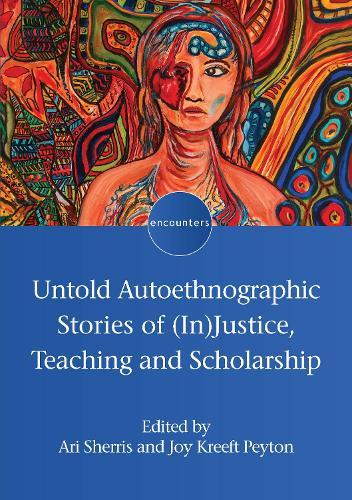Overview
The voices in this book raise questions about the relationalities and entanglements of applied linguists in a troubled world. They are the personal stories that are sometimes hidden behind and within more conventional teaching, research and scholarship, however iconoclastic and unconventional the endeavors themselves. Injustice runs through and across the chapters, connecting one with another but also highlighting differences. The stories in this book describe or picture anxieties, fears, veils, exclusion, erasures, microaggressions, racism and patriarchy, together with the painful double-binds and pitfalls experienced in applied linguistic fieldwork and teaching. By sharing their stories, the authors attempt to embody the changes called into being through their applied linguistics teaching and fieldwork.
Full Product Details
Author: Ari Sherris , Joy Kreeft Peyton
Publisher: Multilingual Matters
Imprint: Multilingual Matters
Dimensions:
Width: 14.80cm
, Height: 2.00cm
, Length: 21.00cm
ISBN: 9781800417342
ISBN 10: 1800417349
Pages: 308
Publication Date: 16 September 2025
Audience:
College/higher education
,
Postgraduate, Research & Scholarly
Format: Hardback
Publisher's Status: Forthcoming
Availability: Not yet available 
This item is yet to be released. You can pre-order this item and we will dispatch it to you upon its release.
Table of Contents
Suhanthie Motha: Foreword: Inhabiting (In)justice Through Our Lives Chapter 1. Ari Sherris and Joy Kreeft Peyton: Embodying Untold Truths: Autoethnographic Textu(r)alities of (In)Justice in and Beyond Applied Linguistics Chapter 2. Rima Elabdali: Embodied Reflexivity: Ethnographic Trouble and the Hypervisibility of the Muslim Body Chapter 3. Gail Prasad: Brown – Blanche? Black: Weaving Multilingual, Multicultural and Multiracial Minoritized Identities Across International Educational Contexts Chapter 4. Elaine W. Chun: Easy-Linguistics Chapter 5. Patriann Smith: Racialized Entanglements of Englishes, Literacies and Peoples Across Transnational Contexts: An Autoethnographic Account Chapter 6. Darshini Nadarajan: Wraiths, Rasa and Rememory: Re-Searching in the Shadows of Peripheral Knowledge and Wisdom in the Quotidian Chapter 7. Ahmar Mahboob / Prof Nomad / Sunny Boy Brumby: “No stars: Nothing to guide me”: Paving Our Destiny by Learning from the Land and Creating Alternative Practices Chapter 8. Adam Haupt: Sample a Look Back: Autoethnographic Reflections on Hiphopography, Language and Identity Chapter 9. Emile Jansen aka Emile YX?: The 4 R’s of Hip Hop Cultural Education Chapter 10. Paul J. Meighan: “Whatever you do, don’t give up!” A Scottish Gael’s Language Reclamation Journey Chapter 11. Tania M. Ka’ai: Privileging Indigenous Māori Knowledge – Reclaiming My Birthright of Language and Culture: An Autoethnographic Story Chapter 12. Kū Kahakalau: Kūlia I Ka Nu’u: Strive to Reach Your Highest Chapter 13. Aurora Tsai: Unlearning Shame and Silence as a Multiracial Woman of Color: My Pursuit of Research for Collective Healing and Liberation Chapter 14. Ayanna Cooper and Shelley Jallow: Fieldnotes from Buffalo Soldiers: Black Educators in TESOL Leadership Chapter 15: Ari Sherris: “Isn’t Ari an Israeli name?” Untethered Discourses, Entangling Troubles Tommaso Milani: Instead of an Afterword
Reviews
Autoethnography has been defined as a postcolonial genre that allows the powerless to talk back. Authors from wide ranging communities in this collection speak against diverse silencing forces in contemporary geopolitics. Beneath the deceptive simplicity of their stories is a complex theorization from new materialism, affect studies, and southern theories to amplify this genre as a heuristics of the heart. * Suresh Canagarajah, Pennsylvania State University, USA * This volume presents a rich collection of autoethnographic stories that delve into the diverse experiences of language researchers and teachers. Highlighting the human side of their journeys, these narratives offer unique insights and profound reflections that push the field of applied linguistics in new and important directions. * Nelson Flores, University of Pennsylvania, USA * We needed a book like this. The writing is stunning, the ideas transformative. Intensely personal and disarmingly honest, it will make you feel and think deeply. A must-read, it sets a new standard in autoethnographic research in applied linguistics. * Lourdes Ortega, Georgetown University, USA *
Author Information
Ari Sherris is a Professor of Bilingual Education at Texas A&M University-Kingsville. His research interests explore communication, meaning making and complex social semiotics in multilingual contexts. Ari also documents and supports indigenous languages and teacher activists reclaiming and revitalizing their languages as they bring those languages into schooling for the Safaliba in Ghana and Salish speakers on the Flathead Reservation in the USA. He has edited four books on indigenous languages, literacies, pedagogies of revitalization and ethnography. His research appears in Writing & Pedagogy, Journal of Multilingual & Multicultural Development, The Canadian Modern Language Review, Language Awareness, and edited volumes. Joy Kreeft Peyton is President of the Coalition of Community-Based Heritage Language Schools in the United States, which connects and collaborates with thousands of schools teaching hundreds of languages, mostly on weekends. She has also worked in Ethiopia, Nepal and The Gambia to develop curriculum, materials and student pleasure reading books in students’ mother tongues.
Tab Content 6
Author Website:
Customer Reviews
Recent Reviews
No review item found!
Add your own review!
Countries Available
All regions
|




